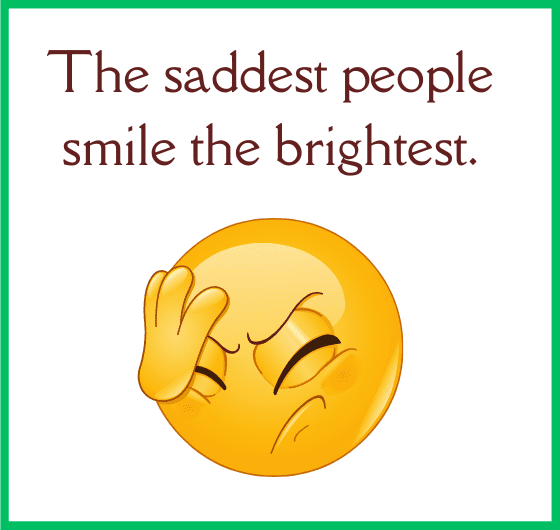When you carry a smile on your face you will seem trustworthy and kind to others, even when you are not happy inside. So, can you pay the price of faking a smile?
A fake smile may fool the crowd, but it never eases the pain” – Kelly Brook
There are many reasons, why people use fake or forced smiles numerous times in the day for their own different reasons, such as:
>> People use fake smiling to appear nice to everyone.
>> People want to be loved and if they are kind, they are liked by all.
>> People use fake smiling to make others feel comfortable in their company.
>> People use fake smiles to fight the virus of “social stigma”.
Many people travel abroad to make the earnings of their lifetime. There they have to work with people from many different communities.
At that time, they force a “fake smile” when working with someone of another race, to show them that they are not racist and that everything is perfectly fine, everything is good and all is well amongst them. This is the reality that why people use fake smiles to fight social stigma.
The saddest people smile the brightest.

People carry fake smiles on their faces just to appear trustworthy and kind to others.
“The prettiest smile hides the deepest secrets. The prettiest eyes have cried the most tears. And the kindest hearts have felt the most pain.”
Does fake smiling make you happy?
“Sometimes life brings you to such a pathetic situation that you feel smiling is far better than explaining why we are sad.”
Researchers have found that a fake smile can also bring a positive impact on the mood and health of a person.
Logic: Even in a fake smile the facial muscles get stretched. Those muscles send a signal and trick your brain into thinking that you are happy. It is evident that facial muscular activity definitely changes the facial expression of a person, but it also generates more positive emotions.
Muscle movement during a smile stimulates the “amygdala”. It is the part of your brain that allows you to feel emotions.
You can fake a smile, but you can’t fake your feelings.
Smiling helps with the release of happy hormones in your body, such as:
>> Dopamine,
>> Serotonin,
>> Oxytocin and
>> Endorphins.
Dopamine increases our feelings of happiness.
Serotonin is related to reduced stress and is an antidepressant.
Oxytocin feeds our happiness by providing us with good friendships and passionate relationships, and
Endorphins act as a pain reliever.
Around the 1800s, Charles Darwin came up with a Theory regarding “facial muscles in happiness” which later came to be known as the “facial feedback hypothesis”
In this study, it was proven that smiling can make you happier, and frowning can make you sad and stressed.
In this study, it was described that changing your facial expressions can intensify or even change your mood. It doesn’t matter if your expressions are fake or real.

Why do I smile when I’m sad?
“Smile and no one will see how broken you are inside.”
When the person is sad, at that time his smile and his confident external appearance are used as a defense mechanism in order to hide their true feelings.
It is possible that you could be in a serious depression. The reasons could be such as:
>> You could be facing a failed relationship,
>> You may be dealing with serious career challenges or
>> You are finding it difficult to live the true purpose of your life.
In these desperate times, any person will use a smile and laughter as a defense to hide his true inner feelings.
Smiling when Sad, is also termed as “Smiling depression”.
Fake Smiling can prevent something bad from happening, but it can also create further misunderstandings.” – Saadat Khan
Another example of “Smiling depression”:
A user named Kyle Larsi (a user in Quora) said that this situation happens to her very often.
She says that my therapist pointed this out several times that I smiled very often when talking about something difficult in my life. She told me that I showed such symptoms because I was afraid of breaking down or crying and said that I was ashamed and afraid of showing my real emotions in front of her and other people.
Larsi said that the above behavior is very accurate in my case because I also smile or laugh when I am telling another person about my stupid habits. I pretend that I am being funny, but actually, I am telling the truth.
Larsi says that I smile when I lie and this especially happens whenever I am explaining my bad feelings to anyone else.
My therapist, especially asked me to talk about my experiences without smiling or laughing, and let me tell you that this was really difficult for me. Sometimes I was unable to speak a single word because I felt that I would start crying the second I open my mouth.
So, in my theory as to “why people laugh when they are sad” because they use “Smile” as a tool:
>> To protect themselves from the shame and humiliation, and
>> To evade the feeling of their real negative emotions.
It’s not always the tears that measure the pain sometime it is the smile that we fake.

There is another theory of nervous/anxiety laughter. This is not a mental disorder, but in this situation, people use laughter as a way to protect themselves from feeling things that are too uncomfortable and painful.
Anxiety laughter is used to escape uncomfortable situations and to make themselves appear happy in front of their rivals and colleagues.
Smiling can also be used as a tool to hide your anxiety and your funny emotions.
“We can always smile, but that doesn’t mean that our hearts are not shedding tears.”
Is smiling natural or learned?
People may be smiling, but they can’t completely hide their sadness behind a fake smile.
Smiling is innate. It means that smiling is natural and not learned. Logic explained further.
All over the world, it is widely assumed that smiling was picked up during our evolutionary past.
Human smiles signal amusement and enjoyment.
Smiling is largely thought of as a natural innate response. We can observe smiling in blind infants and from where did that infant learn to smile if he cannot see?
So, that is why we can infer that smiling is an innate and natural response to happiness.
Although, smiling can also be learned. People tend to fake a smile and appear to be happy when internally they are sad.
Smiling is a social signal conveying our happy emotions.
Smiling is universal, regardless of geographical location, regardless of culture. People all around the world, people of different cultures tend to smile in order to express their happy emotions and comfort.
A real smile is always accompanied by smiling eyes.
Why do people smile in difficult situations?
People often smile in difficult situations for any of the following reasons:
- Because the pain hurts too much to let yourself feel it.
- It is very important to show the world that you are strong and “past this now.”
- Because you may be embarrassed about your pain, or its cause. And you may be desperately trying to escape your pain with your smiling therapy.
- You don’t want help or sympathy from the person you’re speaking to.
- Maybe because you don’t trust the person you’re speaking to and trying to lure him away.
- You will smile when you’re protecting your pain, just to make sure no one takes it away from you. Its deep!
“Life is short. Smile while you still have teeth” — Unknown

Smiling can be used as a tool to hide your depression.
People want to hide their depression because:
>> Of the fear of embarrassment among other people,
>> To appear happy and confident among others.
>> Because they do not want to be tagged a loser.
>> Denying that they feel depressed. As they are not willing to accept their depression, out of concern about appearing weak in front of others.
A SMILE is a curve that sets everything straight.
>> People smile to escape the feeling of guilt and to prove their unrealistic views about happiness to others, and
>> To show others that their life is perfect in every aspect.
“No Situation can ever shake a smiling heart.”- MAC
Why do I smile when I lie?
“The world will always look brighter from behind a smile.” — MAC
People will smile when they lie because of the following reasons:
>> When fooling someone, you will smile because you take delight in it.
>> You will smile, in order to hide your lie under the positivity of laughter.
>> People smile when they lie in order to appear more authentic about their expressions.
>> Smiling when you lie is a natural process. When you lie, your mind is calling out the truth, but the real you, your body, and your mouth are not aligning with your brain. As a result of that, you will tend to feel guilty and then you will try to hide your guilt under your fake laughter.
“Just because I am smiling doesn’t mean I am happy because it takes just one smile to hide a million tears.”
Moreover, when people lie, they blink their eyes several times in a minute. They do so because they get nervous while lying. After getting caught, they feel like committing some kind of treason and they are not happy about it, but still, they do it. Therefore, it proves that people lie in order to appear more authentic.
People get very nervous and sometimes anxious, so smiling becomes the only escape plan to make yourself appear truthful and honest.
Why do I smile while talking?
“Let us always meet each other with a smile, for the smile is the beginning of love.” — Mother Teresa
People smile while talking because they probably want to express warmth and connection with their words. Life is like a mirror and everywhere you will see the reflection of your own image.
So, whenever you stand to speak and smile at your audience, they will smile back at you and that’s for sure. This is how a connection is built will other people and their minds. This is how things work in this world.
The smiling response is natural and innate. It is a very powerful connection with all other beings in this world.
There are many benefits of smiling when you talk, they are:
>> It makes you look authentic and confident among others.
>> Smiling helps you connect with your audience.
>> Smiling when you speak will calm your mind and lessen your anxiety.
>> Smiling when you speak will soothe your body when you are nervous,
>> Smiling increases blood flow, make you look younger, and probably increases your life span.
That is why people have developed this beautiful habit of smiling for ages.
A warm smile is the universal language of kindness” – William Arthur Ward

How to tell if someone is lying?
The truth may hurt for a little while, but a lie hurts FOREVER.
>> You can spot a liar by observing their words and body language in tandem.
>> If a person is lying, you can see that their smile is all wrong.
>> People tend to smile when they lie and over the course of time and with experience, you can tell whether it is fake or a genuine smile.
>> Their actions are not in synchronicity with their words and their actions and eye movements are of someone who is very anxious and nervous.
>> Their words and body language speak different things.
>> When lying, people will use qualifying language to make their point.
For example:
>> Liars will ask the same question again before answering it.
>> They will repeat their question before answering the query.
>> People who lie, will stick to a strict storyline. You’ll often see that the liars will have a definite storyline to answer every question.
They won’t deviate from a specific story, as if they have “mastered the art of lying”.
You will also find that their answers may not match the questions asked.
>> Liars will try to distance themselves away from their subject.
People who lie are seldom confident. They are uncomfortable when they are lying to someone and as a result, they will try to create an appreciable gap from the person they are lying to.
If you see any of these behaviors, you can catch a suspected liar.
Why should you smile less?
More smiling – less worrying, more compassion – less judgment, more blessed – less stressed more love less hate, the best way to love life- Ray bonnet
During the farewell, people treat their loved ones with a “keep smiling” gesture, But smiling, always will not be the best piece of advice for attracting happiness.
The researchers found out that if you are smiling frequently, it may actually make you feel worse at the end of the day.
Excess of everything is always bad for health
Why you are faking your smile, even when you feel down?
People force themselves to smile because of the hope that it will make them feel better just to hide their negative emotions, but this strategy may be a very strong reason for your prolonged sadness.
When you force a smile and force yourself to be happy, it will create a large void of emptiness inside you. You will crave for more love and satisfaction, and try infinite ways to make yourself happy. Your expectations about happiness will eventually increase, but with this mindset, you may never find your “sweet spot” for satisfaction. Moreover, when reality strikes, you feel sad and helpless.
Don’t cry because it’s over, Smile because it happened.
When you smile too much:
>> People may stop taking you seriously.
>> Smiling too much can result in ugly “smile wrinkles” on your face.
>> Faking a smile to appear happy in front of others will leave you with a bucket load of unhappiness.
>> You may feel sad and depressed afterward. When you smile too much it becomes a very uncomfortable habit and it may exhaust you of energy very soon.
Remember, your energy for the day is a finite resource and you have to use it wisely if you want to succeed in life.


